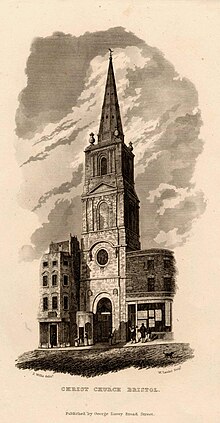Christ Church with St Ewen, Bristol
| Christ Church with St Ewen | |
|---|---|
 | |
| General information | |
| Architectural style | Baroque |
| Town or city | Bristol |
| Country | England |
| Coordinates | 51°27′19″N 2°35′34″W / 51.4552°N 2.5929°W |
| Construction started | 1786 |
| Completed | 1791 |
| Design and construction | |
| Architect(s) | William Paty |
Christ Church with St Ewen (grid reference ST588730) is a Church of England parish church in Broad Street, Bristol, England.

Christ Church was built between 1786 and 1791. The tower appears to have been designed by Thomas Paty who was architect to the vestry, and the body of the church by his son William, and built by Thomas Paty and Sons, replacing a medieval one.[1] The entrance and refurbished interior are by Henry Williams in 1883. The building was restored by Priest-in-charge Rev. G. S. Zimmern in 1973.
On the tower quarter-boy figures strike the quarter hours on the Automaton clock.
It has been designated as a Grade II* listed building.[2][3]

St Ewen's Church
[edit]St Ewen's church was on the north west corner of the medieval cross-roads, opposite Christ Church on Broad Street. A charter of Archbishop Theobald of Canterbury, confirming a vicar called Turstin at the church and threatening that anyone who interfered with the post would be “firmly bound up in the chains of anathema”, is known as the Charter of Theobald or the Curse of St Ewen. It dates to about 1141 and is the oldest document held by Bristol Archives.[4][5] The church was founded in the early 1100s. In 1639, Matthew Hazzard, was appointed vicar of St Ewen's, Bristol. His wife Dorothy Hazzard would allow pregnant women to reside at the parsonage (when they should have been at church) and they also gave homes to families en route to America.[6] The parish was joined with that of Christ Church in 1790.[7] The church was demolished in 1820 to make space for the enlargement of the old Council House, now Bristol Register Office.[4]
Building
[edit]The current Baroque style building, of Bath stone, was designed by William Paty and built between 1786 and 1791. A Victorian restoration was carried out in 1883 by Henry Williams.[3]
Worship
[edit]Worship at Christ Church follows the 1662 Book of Common Prayer and the parish supports the work of the Prayer Book Society in promoting the use of traditional liturgy throughout the Church of England. Scripture readings are taken from the Authorised Version of the Bible. The Parochial Church Council has passed Resolutions A, B and C and does not accept the ministry of women priests.[8]
See also
[edit]- Churches in Bristol
- Dorothy Hazard, wife of a Puritan preacher named Matthew Hazard
- Grade II* listed buildings in Bristol
References
[edit]- ^ Brace, Keith (1996). Portrait of Bristol. London: Robert Hale. ISBN 0-7091-5435-6.
- ^ Historic England. "Christ Church with St Ewen (1282367)". National Heritage List for England. Retrieved 16 March 2007.
- ^ a b Historic England. "Christ Church with St Ewen (1282367)". National Heritage List for England. Retrieved 9 September 2017.
- ^ a b "BBC Bristol, Bristol's oldest document". Retrieved 14 February 2016.
- ^ "Bristol Museums online catalogue". Retrieved 14 February 2016.
- ^ "Hazzard [other married name Kelly], Dorothy (d. 1674), Baptist leader". Oxford Dictionary of National Biography (online ed.). Oxford University Press. 2004. doi:10.1093/ref:odnb/72736. Retrieved 7 March 2023. (Subscription or UK public library membership required.)
- ^ "Churchcrawler". Archived from the original on 19 February 2015. Retrieved 14 February 2016.
- ^ Parish website
External links
[edit]![]() Media related to Christ Church with St Ewen, Bristol at Wikimedia Commons
Media related to Christ Church with St Ewen, Bristol at Wikimedia Commons

